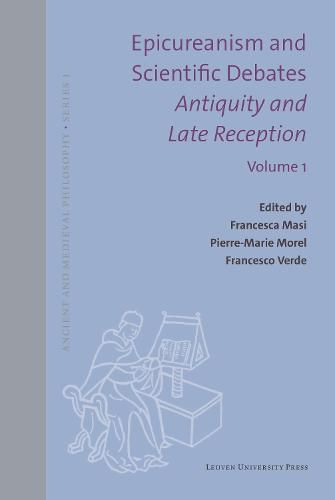Readings Newsletter
Become a Readings Member to make your shopping experience even easier.
Sign in or sign up for free!
You’re not far away from qualifying for FREE standard shipping within Australia
You’ve qualified for FREE standard shipping within Australia
The cart is loading…






Epicureanism is not only a defence of pleasure: it is also a philosophy of science and knowledge. This edited collection explores new pathways for the study of Epicurean scientific thought, a hitherto still understudied domain, and engages systematically and critically with existing theories. It shows that the philosophy of Epicurus and his heirs, from antiquity to the classical age, founded a rigorous and coherent conception of knowledge. This first part of a two-volume set examines more specifically the contribution of Epicureanism in the fields of language, medicine, and meteorology (i.e., celestial, geological and atmospheric phenomena).
Offering a renewed image of Epicureanism, the book includes studies on the nature of human language and on the linguistic aspects of scientific discourse; on the relationship between Epicureanism and ancient medicine, from Hippocrates to Galen; on meteorological phenomena and the method of explaining them; and on the reception of Epicurus's legacy in Gassendi.
Contributors: Julie Giovacchini (CNRS, Paris), Francesca Masi (Universita Ca' Foscari Venezia), Dino De Sanctis (Universita degli Studi della Tuscia), Chiara Rover (Universitat Hamburg/MCAS), Enrico Piergiacomi (Universitat Zurich), David Leith (University of Exeter), Vincenzo Damiani (Universitat Ulm), David Konstan (New York University), Voula Tsouna (UC Santa Barbara), Jurgen Hammerstaedt (Universitat zu Koeln), Craig Martin (Universita Ca' Foscari Venezia), Frederik Bakker (Radboud Universiteit)
$9.00 standard shipping within Australia
FREE standard shipping within Australia for orders over $100.00
Express & International shipping calculated at checkout
Epicureanism is not only a defence of pleasure: it is also a philosophy of science and knowledge. This edited collection explores new pathways for the study of Epicurean scientific thought, a hitherto still understudied domain, and engages systematically and critically with existing theories. It shows that the philosophy of Epicurus and his heirs, from antiquity to the classical age, founded a rigorous and coherent conception of knowledge. This first part of a two-volume set examines more specifically the contribution of Epicureanism in the fields of language, medicine, and meteorology (i.e., celestial, geological and atmospheric phenomena).
Offering a renewed image of Epicureanism, the book includes studies on the nature of human language and on the linguistic aspects of scientific discourse; on the relationship between Epicureanism and ancient medicine, from Hippocrates to Galen; on meteorological phenomena and the method of explaining them; and on the reception of Epicurus's legacy in Gassendi.
Contributors: Julie Giovacchini (CNRS, Paris), Francesca Masi (Universita Ca' Foscari Venezia), Dino De Sanctis (Universita degli Studi della Tuscia), Chiara Rover (Universitat Hamburg/MCAS), Enrico Piergiacomi (Universitat Zurich), David Leith (University of Exeter), Vincenzo Damiani (Universitat Ulm), David Konstan (New York University), Voula Tsouna (UC Santa Barbara), Jurgen Hammerstaedt (Universitat zu Koeln), Craig Martin (Universita Ca' Foscari Venezia), Frederik Bakker (Radboud Universiteit)